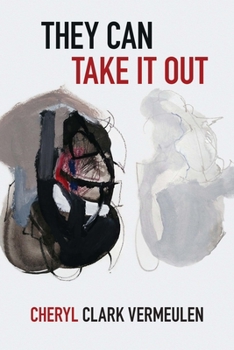They Can Take It Out
Fiercely the speaker shares her life as a woman with cancer, the invasions and intimacies of the battle against it, the healing, and the quest to make new life for herself and her family. Says Cole Swenson, Weaving illness, art, and pregnancy together as if surprising, even stunning, twists of phrasing could out-maneuver a cancer or guarantee conception, the poems in this collection cover an amazing range of human event and emotion. But fascination and a rare kind of deeply-informed delight win out--there's a zeal for life that rings throughout the whole, a commitment to vigor in the face of inevitable diversity, and a delicate humor that invites the reader to hope.
Nikki Wallschlaeger adds, Bodies are a biological tapestry of the environments that made them. Unfortunately, even though they belong to us, they are often out of our control. Vermeulen writes, 'They're beads. A string of beads. / Civilizations.' Cells that contain the worst about human society-- 'Awe and disease. Conquest.' What to do about it? Remove what doesn't work, what hurts, what kills. It's not that easy. THEY CAN TAKE IT OUT speaks to the experience of disease as a relationship with what's outside the human body. 'Immortal cells are cancerous cells. They don't stop dividing.' Civilization is the diagnosis. Finally, Amaranth Borsuk concludes, Full of memory and movement, painting and dance, the speaker in THEY CAN TAKE IT OUT acknowledges 'Art is my favorite future.' Navigating loss upon loss, she knows that 'we love a woman looking sure-footed, ' but that every dance is, as they say, a controlled fall. In these poignant and pointed poems, Vermeulen shows us the body in descent, tracking its graceful gestures, its pantomimes and procedures to show we each carry something extra that, though they may take it out, makes us fundamentally ourselves.
Poetry. Women's Studies.
Related Subjects
Poetry




